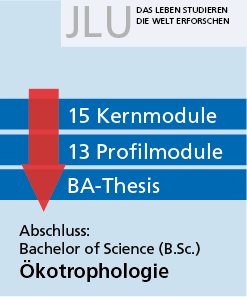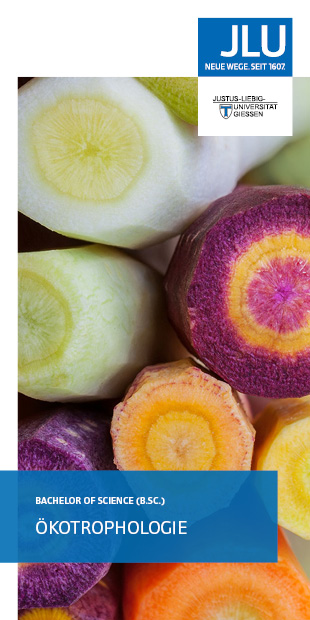Nutritional Sciences and Home Economics (B.Sc.)
Taught in German
Overview
- Overview
-
Content
Where does our food come from, how is it produced and what is its composition? What factors influence our eating habits? What do we eat and what impact does it have on our bodies, the environment and society? How do we achieve a healthy and sustainable diet for the planet and for us humans?
Ecotrophology deals with these and many other questions. The degree programme is interdisciplinary. This means that during your studies you will deal with questions, methods and ways of thinking from different disciplines. These include the natural sciences, social sciences, economics and technology. Ecotrophology takes a systemic view of human nutrition, which is why we speak of food systems: We look at food in its production, on the plate and beyond. In doing so, we have not only a scientific but also a psychological-sociological view of our nutrition: How do we make decisions about what we eat? What role do higher-level drivers such as politics, culture, economics and technology play in this? How does advertising affect us?
Students of the Bachelor's degree programme in Ecotrophology receive a broadly based education by gaining insight into the various disciplines. The content covers the entire food system: from supply chains to consumer behaviour to various facets of nutrition itself. The focus is on the consequences of the food system on an ecological, economic and social level and the development towards more sustainability in the entire system.Subject-specific prerequisites
In addition to the formal entry requirements (see application), we expect an interest in the natural sciences as well as in people and social, economic and ecological issues. Basic knowledge of mathematics, chemistry and physics is advantageous. JLU offers preliminary courses in which you can refresh your knowledge before starting your studies. This way you are optimally prepared for your studies.
-
Number of enrolled students
481 students are enrolled in this bachelor degree course (as of winter semester 2022/23).
Accreditation
since 28 September 2007.
Composition of the Study Programme
- Degree BSc
-
Degree
Bachelor of Science (BSc)
- Duration of studies 6 Semester 180 Credit Points (CP)
-
Duration of Studies
6 Semesters - 180 Credit Points (CP)
- Composition of the Study Programme
-
Components of the study programme
The programme consists of 17 core modules (compulsory modules) and 11 profile modules (elective modules). Each module has a scope of 6 CP (4 hours per week for one semester) and concludes with a course-related examination. The grades achieved in the individual module examinations result in the final degree grade. In addition, the programme includes a Bachelor's thesis, which is equivalent to 2 modules. This proves that you are capable of independently writing a scientific paper.
Individual profile
The development of an individual profile plays a major role in the degree programme. Our students decide for themselves whether they want to acquire a broad all-round knowledge or prefer to specialise, whether their studies are more practice-oriented or scientific and theoretical. They can choose profile modules from the complete range of courses offered by the Department 09 or even from other departments at JLU.
Practical relevance
In addition to choosing practice-oriented modules, students have the opportunity to complete an internship to gain a first insight into professional life. Module BP 144 "Professional Internship" corresponds to 12 CP and can be chosen as a profile module in all Bachelor's degree programmes of Faculty 09. In this way, students familiarise themselves with the professional world and get suggestions for the individual organisation of their further studies. The Internship Office maintains a database of suitable companies and institutions and supports students in their search for a suitable internship.
Composition of degree programme

The course content is divided into modules. Each module has a scope of four semester hours 6 CP (4 semester hours each) and concludes with a course-related examination. The grades achieved in the individual module examinations result in the final degree grade.
17 of the modules are compulsory (core modules), 11 modules are profile modules and can be selected from the entire range of courses offered by the department. The Bachelor's thesis corresponds to the scope of two teaching modules.
Individual specialisation takes place through the choice of profile modules. The degree programme is successfully completed when all modules have been passed.1st semester 2nd semester 3rd semester Economics and business administration Anatomy and Physiology I Mathematics and Statistics Fundamentals of process technology and thermodynamics Human nutrition Nutritional Physiology Sustainability of food Politics of the agricultural and food economy Consumer behaviour Food systems Introduction to catering management
Basics of nutrition therapy Marketing in the agricultural and food industry General Chemistry Basics of counselling 4th semester 5th semester 6th semester Introduction to empirical social research Specialisation Module 4 Specialisation Module 9 Sociology of nutrition Specialisation Module 5 Specialisation Module 10 Specialisation Module 1 Specialisation Module 6 Specialisation Module 11 Specialisation Module 2 Specialisation Module 7 Bachelor's dissertation Specialisation Module 3 Specialisation Module 8 Bachelor's dissertation Specialisation modules
Broad all-round knowledge or specialisation - both are possible. Our students have it in their hands, they put together their studies according to their individual inclinations from the entire range of our offerings. In a catalogue of over 80 modules, students can choose profile modules from the following topics, for example:
- Human nutrition
- Dietetics
- Biochemistry and molecular biology
- Nutritional Medicine
- Nutrition and the Immune System
- Food Sciences
- Molecular Nutrition Research
- Communication and Counselling
- Nutritional and Environmental Psychology
- Consumer Behaviour
- Market theory
- Agricultural, food and environmental policy
- Business administration
Modules from other research fields of the department can also be chosen, e.g. agricultural production and its impact on the environment, applied microbiology, soil science, insect biotechnology, plant production and breeding and animal welfare.
The exact names and descriptions of the profile modules can be found in the Special Regulations.
Application
- Commencement of Studies in the Winter Semester
-
Commencement of studies
Only possible in the winter semester
- Entrance Requirements Abitur ohne Praktikumsnachweis
-
Entrance requirements
- Applicants must have an Abitur (German school leaver's examination for university entrance) or equivalent. More on this...
- Certification of a pre-professional practical period is not required.
-
Special regulations apply to foreign applicants or those who gained their university-entrance qualifications abroad. Read more...
- Application not limited only winter
-
-
Application / Enrolment
-
The study programme is not subject to admission restrictions.
-
The enrolment period for the winter semester begins at the beginning of June.
-
The end of the enrolment period is determined anew each year, please enquire in the application portal during the enrolment period.
Different rules apply in some cases for international applicants. More...
-
-
Career Options
- Career Options
-
Options for further study at JLU
After successful completion of the Bachelor's degree, the following consecutive Master's degree programmes can be studied at JLU (consecutive means that a relevant Bachelor's degree is the basic requirement for admission to the Master's programme):
- Ecotrophology (M.Sc.)
- Sustainable Food Management (M.Sc.)
- Sustainable Transition (M.Sc.) - (taught in english), digital
- Tranistion Management (M.Sc.) - (taught in english)
JLU's Faculty 09 offers further Master's degrees.Career options
With the degree in ecotrophology (B. Sc.) you are broadly positioned and have many different opportunities to enter professional life - whether in a company, in the public sector or in a self-employed position. You can work in the following areas, for example:
- Nutrition counselling and therapy
- Quality assurance, management and product development
- Marketing and sales
- Press and public relations
- Market and opinion research, consumer/customer service
- Management in community catering or in the health sector
- Consumer advice, information and protection
- Research and teaching
Further Information
- Further Information: Documents
-
PDF documents for the courses of study
- Flyer (in German)
- Study guide (in German)
Examination- and study regulations
- Special regulations (in German)
(with module descriptions and module plans) (in English)
(Please note that only the German version of the modules is offical and legally binding. The english Version is for informative purposes only.) - General study regulations for modular and multi-stage study programmes
Courses offered in the course catalogue
- Electronical course catalogue (in German)
- Bachelor's Degree Programmes of Faculty 09
- International pages
-
Please have a look at our International Pages for more information in English.
- Any Questions
-

Any Questions?
Information- and advisory services of JLU can be found under the category “contact” on this page!
- Help
-
Do you need assistance in choosing the right courses of study?
- Offers: Courses of study
-
Which courses of study suits me best?

Ask Justus offers information for prospective students
Events for prospective students

There is a whole range of events offered by JLU, current events can be found under “news”:
www.uni-giessen.de/studium (in German)
Contact
- Contact
- Subject Advisors
- Contact Subject Advisor
-
Team for Studies and Doctorates of the Faculty 09
Academic advisor
Prof. Dr. Wencke Gwozdz
Institut für Wirtschaftslehre des Haushalts und Verbrauchsforschung
Bismarckstraße 37
35390 GießenPhone: +49 (0)641 - 99 39360
Office hours: on appointment
E-Mail: Wencke.Gwozdz
- Central Study Advisor
- Anja Staffler
- Central Student Services
-
- Students office →
(for formal matters like matriculation) - Central student advisory office
(advice for students & prospective students) - Hotline Call Justus
(first contact for all matters pertaining to studies) - International office →
(for international students)
- Students office →

